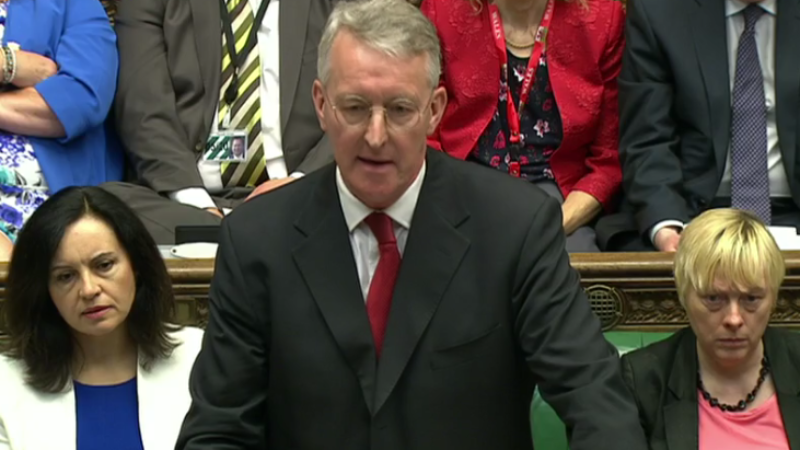

Hilary Benn warned that a UK exit from the European Union would weaken our opposition to ”Russian aggression”. The shadow Foreign Secretary highlighted the “moral interest” in European nations coming together to prevent conflict and tackle climate change and poverty.
The speech, given at Chatham House this morning included the advice that Putin would “shed no tears” at a Brexit. Benn argued that the Russian leader would see a leave vote as a “sign of our weakness and of the weakness of European solidarity”. Instead, the UK should “maintain our collective strength” through integration with Europe.
The shadow foreign secretary highlighted the success of the EU’s response to the Crimea crisis of 2014, pointing out that EU sanctions had resulted in a ceasefire which was “largely holding”.
Benn praised the EU’s international diplomacy as achieving more than Britain could secure by itself in opposition. EU sanctions on Russia would be strengthened by he creation of an EU-wide energy union. He argued that only the EU could weaken Russia’s “dominance” as an energy supplier.
He went on to outline Russia’s “indiscriminate bombing campaign” in Syria had worsened Europe’s refugee crisis, giving us all the more reason to tackle this “unacceptable” behaviour.
Benn evoked the last Labour government’s successes on climate change and African debt relief in a heartfelt plea to persuade Britons to vote to stay in the EU.
In a series of personal comments he also described his own transformation, from voting to leave in the last referendum, in 1975, to forming the belief that international co-operation is necessary for the future of “this small and fragile planet”.
Benn, who narrowly survived as shadow Foreign Secretary in the January reshuffle, is now a staunch pro-European and said “the case for Europe is stronger now than ever”.
He is credited with pushing Jeremy Corbyn into accepting a pro-EU stance despite the Labour leader being known to have far cooler views over the last few decades, much like Benn’s own father, Tony.
Today, at the Chatham House think tank, Hilary Benn admitted Europe had come under strain during the refugee crisis but said the answers lay in working with institutions such as the EU and the UN.
“The flow of refugees has put the Schengen [free movement] agreement under enormous strain and has tested Europe’s solidarity to the limit. But imagine what would have happened – what would be happening now on the continent of Europe – if the European Union did not exist.
“The fact is that in Europe, as elsewhere in the world, we not only have a moral interest in preventing conflict, stopping dangerous climate change and promoting economic development to overcome poverty in developing countries, but also a practical interest in doing so.”
Benn was speaking as Donald Tusk, the European Council president, sent a new draft of David Cameron’s proposed reform deal to EU members. Tusk said negotiations are in a “fragile” state.
Benn outlined a bleak list of international problems facing but returned to the “internationalist case” for remaining in the EU.
“In an increasingly interconnected world the divide between foreign and domestic policy will become ever more blurred and whether it is fighting climate change, reducing poverty, dealing with conflict, water, land, energy or the consequences of migration, they all will require an internationalist outlook.”




More from LabourList
‘Labour council candidates – it’s tough, but all is not lost’
‘Labour won’t stop the far right by changing leaders — only by proving what the left can deliver’
‘Cutting Welsh university funding would be economic vandalism, not reform’